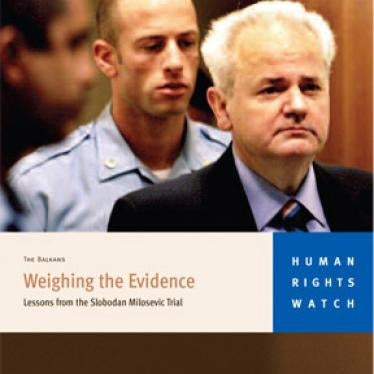The trial of Slobodan Milosevic, which ended with his death before a verdict could be rendered, has provided important evidence about the role of Belgrade in pursuing the conflicts in the former Yugoslavia, Human Rights Watch said in a report released today.
“Although Milosevic was never convicted, evidence exposed at his trial showed how Belgrade orchestrated the vicious wars in Bosnia, Croatia and Kosovo,” said Sara Darehshori, senior counsel in the International Justice Program at Human Rights Watch. “The Milosevic trial also shows how to manage – or not – future prosecutions of high-ranking officials for crimes of huge magnitude.”
The 76-page report, “Weighing the Evidence: Lessons of the Slobodan Milosevic Trial,” examines key evidence introduced at trial, the most comprehensive account to date of the conflicts in Croatia, Bosnia and Kosovo. The report finds that the trial revealed how leaders in Belgrade and the Federal Republic of Yugoslavia financed the wars; how they provided material to Croatian and Bosnian Serbs; and how they created administrative and personnel structures to support the Croatian Serb and Bosnian Serb armies. The report traces the mechanisms, some of which were previously secret, by which Belgrade fueled the conflicts.
The June 2001 surrender of Milosevic to the International Criminal Tribunal for the Former Yugoslavia (ICTY) created high hopes and tremendous controversy in the former Yugoslavia. His trial was the first and likely the only ICTY case to examine Belgrade’s role in all three conflicts. Milosevic’s death on March 11, 2006, was an unfortunate end to the “trial of the century” that deprived the Yugoslav wars’ many victims of a final judgment.
The length and conduct of the trial had already raised concerns among court observers, but its abrupt end ignited a storm of criticism about the inefficiency of such trials and their viability. It was seen by many as a setback for the work of international criminal courts. The tribunal is still grappling with how to deal with accused war criminals who, like Milosevic, insist on representing themselves.
The report examines criticism of the Milosevic trial and draws trial management lessons useful to national and international courts tackling war crimes.
“There’s a great deal to learn from the way the proceedings were conducted,” said Darehshori. “Starting the trial 11 days after the decision to combine charges on Kosovo, Croatia and Bosnia in a single case had a very negative effect.”
The lessons for future trials discussed in “Weighing the Evidence” include:
• Ensure an adequate pretrial period for an expeditious trial in order to narrow the issues and allow all parties to fully prepare;
• Limit charges against the accused to the most serious crimes alleged, and avoid duplication;
• Limit the number of crime scenes in the trial of a high-level official;
• Require that the right to represent oneself be subject to the defendant’s ability to fulfill the role of counsel and attend court sessions regularly; and,
• While increased use of written testimony can expedite proceedings, care should be taken to ensure that observers have access to the written testimony and can follow the cross-examination.
Background
On May 24, 1999, the ICTY indicted Milosevic, along with four other senior officials and officers, for war crimes and crimes against humanity committed by Yugoslav and Serbian troops under their command in Kosovo in early 1999. The alleged crimes include the slaughter of hundreds of ethnic Albanians, forcible deportations of hundreds of thousands of people, and persecution based on racial, religious, and political identification.
The tribunal indicted Milosevic a second time on October 8, 2001, for crimes he allegedly committed in Croatia. The indictment charges Milosevic with multiple counts of murder, torture, detention, deportation and other atrocities committed during the attempted ethnic cleansing of Croatia from 1991 to 1992.
On November 22, 2001, the ICTY issued a third indictment against Milosevic for crimes in Bosnia. The indictment includes one count of genocide, one count of complicity with genocide, and an additional 27 counts of war crimes and crimes against humanity arising from the conflict in Bosnia-Herzegovina between 1992 and 1995. The Bosnia charges cover the shelling of Sarajevo and the mass murder of thousands of Muslim men and boys at Srebrenica, both UN-proclaimed “safe areas,” and the Omarska detention camp.
The trial for all three indictments began on February 12, 2002, and ended after Milosevic’s death on March 14, 2006.







